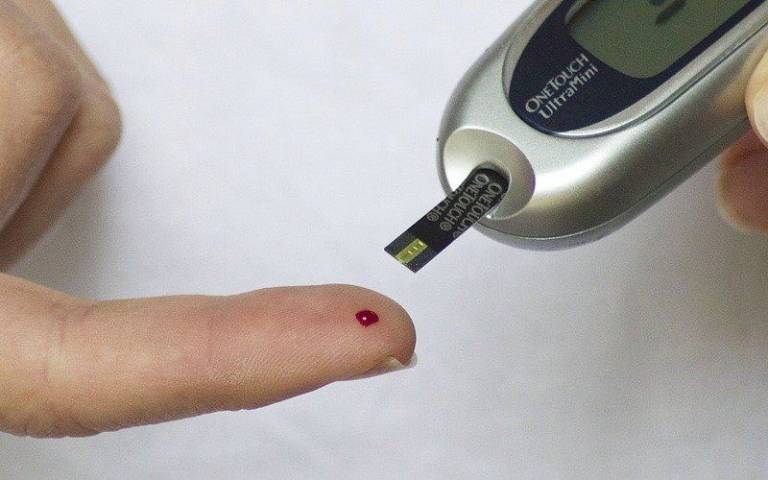Levels of diabetes have trebled in 25 years
15 December 2020
The proportion of adults with diagnosed diabetes trebled between 1994 and 2019, report researchers from UCL and the National Centre for Social Research (NatCen), who have analysed the latest results from the Health Survey for England (HSE).

The report, which is commisisoned by NHS Digital, analyses data from over 8,200 adults and 2,000 children living in private households in England and shows the percentage of people who have been diagnosed with diabetes has risen since 1994, from 3% to 9% among men and from 2% to 6% among women.
The researchers found that total diabetes (which includes both diagnosed cases and people found by the survey to have undiagnosed diabetes) is much more common among people with lower incomes and also among those with obesity. For example, 16% of people in the lowest income group had diabetes but only 7% in the highest income group. The proportion of adults with total diabetes increased from 5% of those with normal weight to 9% of adults with overweight and 15% of adults with obesity.
Additionally, the report highlights that adults living in the most deprived areas are the most likely to be obese. This difference was particularly pronounced for women, where 39% of women in the most deprived areas were obese, compared with 22% in the least deprived areas. The survey also found that children’s obesity was closely associated with whether their parents’ were overweight or obese.
Professor Jennifer Mindell, co-editor of the report, (UCL Research Department of Epidemiology and Public Health) said: “Over the past few decades, diabetes has become more common in both high and low income countries. We have known for a long time that diabetes increases the risks of developing circulatory diseases and cancers.
“We have seen this year that it also increases the risks of serious infection and death in people infected with COVID-19. Diabetes is much more common in people with obesity. The COVID-19 pandemic has rightly prompted greater focus on obesity reduction, which will also help with the problem of rising diabetes.”
For the first time, the survey also asked about GP consultations. It shows that 69% of men and 82% of women had consulted a GP in the previous 12 months. GP consultations are more common in older ages, especially among men, and also increase with Body Mass Index (BMI): 80% of adults with obesity reported having a GP consultation in the last year, compared with 74% of overweight and normal weight adults.
84% of respondents said they had consulted their GP solely for a physical health problem, 5% for a mental health, nervous or emotional problem and 11% for both types of problem in the last 12 months. Women were more likely than men to have discussed a mental health problem with their GP and to use counselling or therapy services for a mental health problem.
The report finds that consultations for mental health problems were more common among those from lower incomes: 25% of adults in the lowest income group had a consultation about a mental health problem in the last year, compared with 15% of adults in the highest income group.
Additional reports on HSE 2019 include findings on adult health behaviours, carers and eating disorders.
Elizabeth Fuller, co-editor of the report and Research Director at NatCen, said: “Alongside the findings about diabetes, this year’s report includes significant insights into the prevalence of disordered eating. One in five women and one in eight men in England screened positive for a possible eating disorder, which can mean eating too much or too little, obsessing with weight or body shape, having strict routines around food or purging after eating. We found people who are obese, younger adults and women are more likely to screen positive for a possible eating disorder.”
Links
- Professor Jennifer Mindell's academic profile
- NatCen Social Research
- Health Survey for England reports
- Health Survey for England Method report
Image
Credit: Tesa Photography source: Pixabay (CC.2.0)
Media contact
Rowan Walker
Tel: +44 (0)20 3108 8515
Email: rowan.walker [at] ucl.ac.uk
 Close
Close

